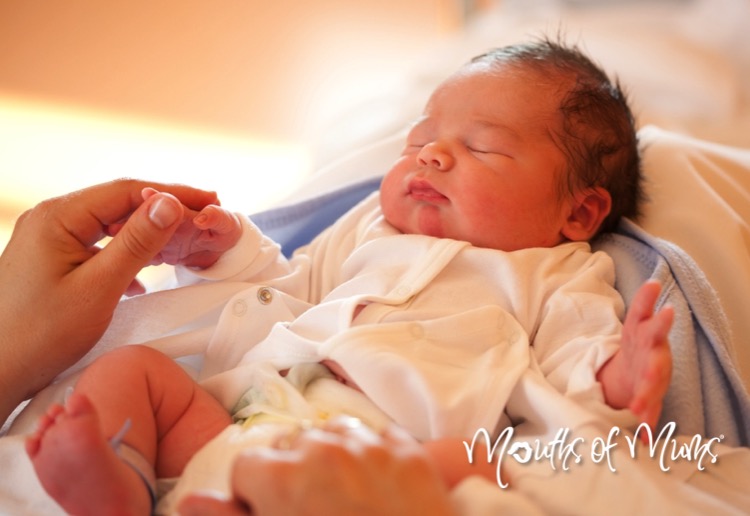Since my own birthing experience, I have to be honest; I find it incredibly hard to look at a birth announcement that describes the mode of delivery.
If we think for a minute, they might mention water, lack of drugs, speed of delivery etc. etc. I’m generalising massively, but they rarely say something like ‘mum was vomiting all over herself in pain, needed a drip, nearly tore the anaesthetist’s heart out waiting for the epidural and got her vagina ripped so badly she required a blood transfusion’.
Typically, they might look more like this:
‘Our beautiful (insert name) came into the world at 4.20pm, by natural delivery with a little gas and deep breathing’.
If you have a natural birth and don’t require drugs, yes you are most likely an awesome warrior woman and I salute you. I understand your pride because labour HURTS. However you can surely settle for an internal high five or a high five from your partner?
My reason for having such a strong opinion on the subject is that my brain automatically wonders how the mother’s pelvic floor is. Yes, it’s weird, but when you have an interest in this field and spend your time trying to understand the complex world of delivering babies, my thoughts usually go like this:
Example 1: After seeing a baby born in an hour – I think that’s a lot of pressure on your pelvic floor muscle, I wonder how stretched or intact it is?
Example 2: After hearing someone was in a long labour – I wonder how long the second stage (pushing) was – how much did the pelvic floor muscle go through?
I basically wonder how a woman’s pelvic floor, that supports the bladder, uterus and bowel and which also plays an important role in bladder and bowel control and sexual function – is holding up because we never hear of the ugly aftermath that happens to so many.
Once upon a time I was part of the natural birth brigade and I am still all for it IF you are well informed of the risks. When I was pregnant, a well-meaning friend gave me a lovely book called ‘Gentle Birth, Gentle Mothering’. I devoured it and after reading about how awful caesareans, epidurals or any interventions are (and how important coming through the birth canal is for the baby) my mind was set. I was having a ‘natural’ birth.
Interestingly, there was no mention of vaginal tearing or pelvic organ prolapse and all the other fun stuff that can happen after giving birth to a baby. Here is my two cents worth: (THIS IS NOT FORWARD THINKING)
The baby’s health and wellbeing is crucial, I’m in no way disputing that, I just feel we need to understand that caesareans are not as bad as we’re conditioned to believe. I have heard countless horror stories of situations where a mother’s well being is completely disregarded. The fact is – when you are in labour it is very hard to make an informed decision, even if your midwife or obstetrician tells you about the risks, because you just want that baby out. We need to know the risks long before we’re in birth mode.
Pelvic trauma resulting from childbirth can range from inconvenient leakage to having your organs fall out! Sadly there is little research on the psychological effects of a traumatic birth. Now let’s consider the fact that the mother will most likely be the primary carer of the newborn baby and if she is suffering from PTSD after a traumatic birth it may, as it does in some cases, affect her ability to fully bond with the baby.
Let me just say again, a natural birth is a beautiful choice as long as you know ALL the facts.
After an awesome workshop I did the other day run by the Continence Foundation of Australia and Pelvic Floor First here are some snippets I took away from it:
If you are a younger mum, typically under 35, you will have more collagen in your muscles, which means that they are more able to stretch effectively and recover. As you age your muscles tighten and the same goes for your pelvic floor muscle. Fortunately, I have learned so much from the work of Professor Hans Peter Dietz (Obstetrician/Gynaecologist and RANZCOG-certified subspecialist in Urogynaecology) who is an internationally renowned expert in pelvic floor imaging researching the prevention and treatment of maternal pelvic floor trauma related to childbirth. Professor Dietz has 25 years experience in the study of damage to pelvic organ support structures associated with childbirth and is recognised for his pioneering research in the field.
Professor Dietz’s studies suggest 10-30% of women delivering their first child vaginally will sustain damage to these structures affecting sexual relations and perhaps resulting in prolapse, and urinary or faecal incontinence. Clinicians rarely identify this type of injury or inform women of the risks of it. More education and a change of practice is required.
The sad reality is that hundreds upon hundreds of new mothers will leave hospitals all over the world with no clue as to the extent of the damage that their pelvic floor muscle has sustained.
What happens next? You might start to experience some incontinence issues, which you may attribute to normal bodily function after having a baby. I need you to know that any kind of bladder (or bowel) leakage is not normal. However here is the sad reality; 70% of women with incontinence will not admit to the problem, not even to their GP, yet in most cases it can be cured or well managed.
You may find that you have no issues until you get back into exercise. Let’s not forget that we are in the world of ‘fitspo’ (or as I prefer ‘shitspo’) and the rise of the yummy mummy. Personally I couldn’t wait to jog with my daughter in her pram, I thought I’d be one of those fit mums, doing burpees in the park (FYI – if a personal trainer ever tries to get you to do burpees as a postpartum mother, leave and find a new trainer who enquires about your pelvic floor health).
I went to the doctor for my 6 week check and got the all clear for exercise. Fortunately I trusted my gut feeling and saw a women’s health physiotherapist who encouraged safe exercise. Yet, I wonder how many new mums go on to exercise too soon, with extensive injuries that are ‘out of sight, out of mind’. They start their mummy bootcamps or running routine without knowing how to manage a severely damaged pelvic floor muscle and so they end up with pelvic organ prolapse (POP) when it could have been prevented.
So my hope is that one day we will just celebrate the birth of a healthy baby and remove the need to broadcast the type of birth. Women who have emergency caesareans and women who have elective caesareans should ALL be celebrated for their bravery too. No matter how your baby comes into the world, you are still an incredible warrior mum.
Common Symptoms of POP include: tissues bulging from the vagina, urinary or faecal incontinence, chronic constipation, pressure or fullness in the vagina, rectum or abdomen, urine retention, painful sex or inability to retain a tampon. If you are experiencing any of these symptoms please seek advice from a specialist, do not suffer in silence.
Can you relate to this? Please share in the comments below.





















-

-
-
meedee said
- 21 Jul 2021
-

-
-
tessie said
- 29 Jul 2016
-

-
-
ella12 said
- 26 Jul 2016
-

-
-
Jodilb said
- 25 Jul 2016
-

-
-
rovermum said
- 25 Jul 2016
-

-
-
mom134803 said
- 21 Jul 2016

-

-
-
mom101628 said
- 20 Jul 2016
-

-
-
mom70876 said
- 08 Jul 2016
-

-
-
mom70876 said
- 04 Jul 2016
-

-
-
june11 said
- 01 Jul 2016
-

-
-
mom19782016 said
- 25 Jun 2016
-

-
-
hologro said
- 22 Jun 2016
-

-
-
BellaB said
- 20 Jun 2016
Post a comment11:14 am
10:59 am
-

-
-
Amy Dawes replied
- 29 Jul 2016 , 3:46 pm
Reply12:32 pm
-

-
-
Amy Dawes replied
- 29 Jul 2016 , 3:45 pm
Reply12:00 pm
-

-
-
Amy Dawes replied
- 29 Jul 2016 , 3:50 pm
Reply10:37 am
7:36 am
-

-
-
Amy Dawes replied
- 29 Jul 2016 , 3:53 pm
Reply11:48 pm
10:07 am
1:30 pm
5:44 pm
10:05 pm
-

-
-
Amy Dawes replied
- 29 Jul 2016 , 3:56 pm
Reply11:52 am
-

-
-
mom136464 replied
- 20 Jul 2016 , 9:37 pm
Reply11:32 am
To post a review/comment please join us or login so we can allocate your points.